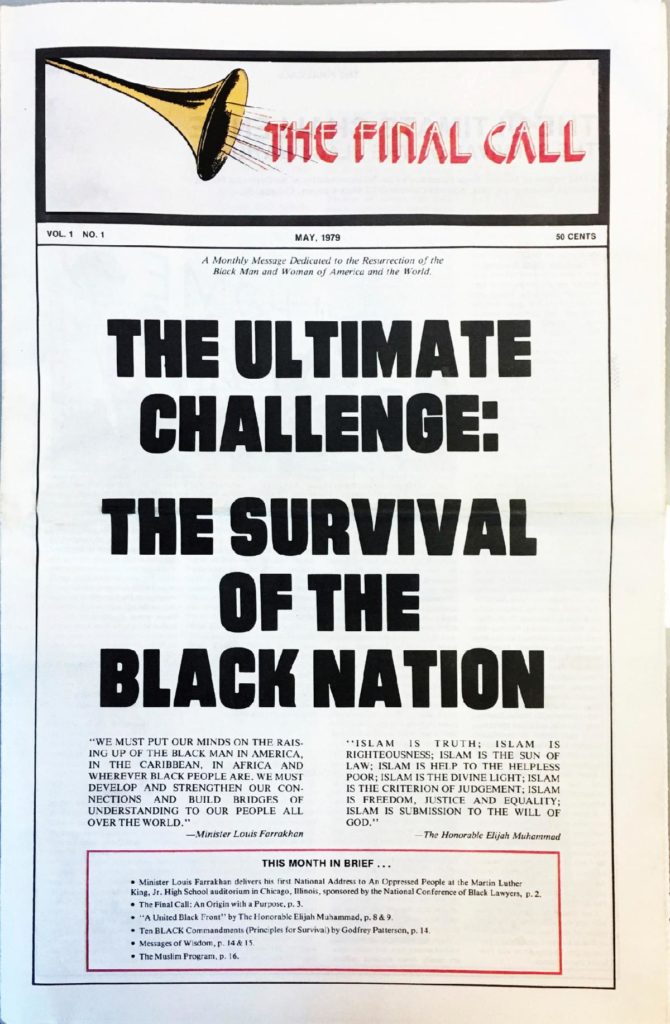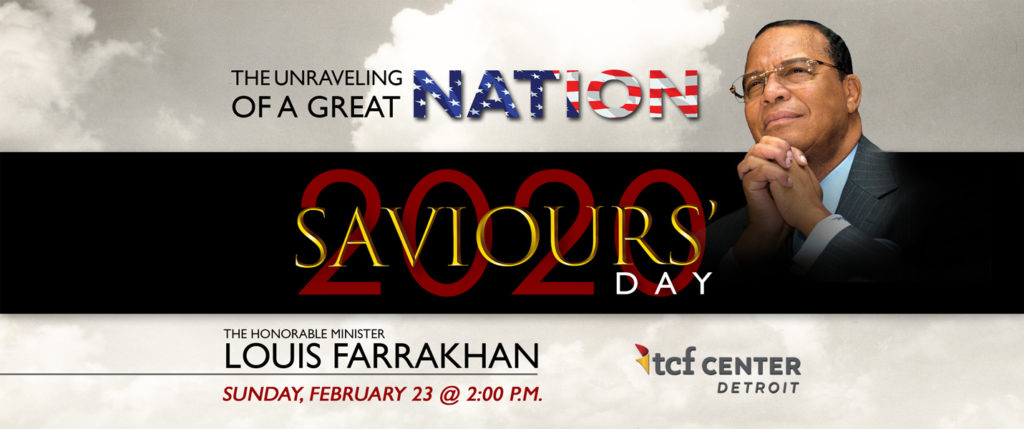
CHICAGO–From its inception in 1979 until today, The Final Call newspaper has consistently delivered a message dedicated to the resurrection of the Black man and woman of America and the world.
“The Final Call has a unique mission and purpose and when you look back at our first edition, essentially it was about the survival of the Black nation. Forty years later that still is the question, concern and mission-in particular coming after the first Black president. We have seen a whitelash … a president who has really shown what is deep in the hearts of the people and how vulnerable our people remain,” said Final Call editor in chief Richard B. Muhammad.
At the upcoming Nation of Islam national convention in Detroit, Saviours’ Day 2020, Feb. 21-23 in the Motor City, The Final Call will mark 40 years of publishing with a banquet and celebration that will also pay tribute to the Honorable Minister Louis Farrakhan, the founder and publisher of the award-winning newspaper.

The dinner, which is open to the public, will be held Friday, Feb. 21, at the TCF Center Ballroom, in downtown Detroit. The doors will open for the evening program at 6 p.m. EDT. Tickets are $100 and a table of 10 seats is available for $1,000. Individual tickets and table tickets can be ordered at www.noi.org.
“This will be an incredible night, an historic night and an opportunity to recognize those who have worked hard to establish The Final Call and to show love, appreciation and gratitude to the man whose vision, sacrifice and integrity lie at the cornerstone of any success that Allah and His Christ have allowed us to have,” said Mr. Muhammad.” Those of us who read Muhammad Speaks were delighted when we discovered that the Minister was relaunching it under a new masthead, The Final Call, because nowhere else could we get the kind of editorial content that was published in Muhammad Speaks,” said Dr. Conrad Worrill, chairman emeritus of the National Black United Front (NBUF) and longtime Final Call reader and contributing columnist.

Launched in the basement of Min. Farrakhan’s home in 1979, The Final Call has a reputation in the Black community by being a fearless, uncompromising seeker of truth. The year 2019 marked its 40th year of continuous publication. “Our people need a voice. They need a guardian, a watchman, someone who will stand and point out these dangers, and contradictions, call us to unity and to the word and mission and the saving message of the most Honorable Elijah Muhammad, which Min. Farrakhan has been delivering to us now for 44 years in the absence of his teacher. An essential part of delivering that message is The Final Call newspaper,” added Mr. Muhammad.
The Final Call remains Black America’s sole nationally distributed, independent, Black-owned print newspaper. It also has a digital edition and an active presence on social media platforms. But before social media that brought news to people across the country in real time, The Final Call had reporters and writers connecting the dots by showing Black people in New York what was happening in Los Angeles and vice versa and covering all in between. In 1996, The Final Call amplified the three-part series by investigative reporter Gary Webb of the San Jose Mercury News that exposed a cocaine distribution network connected to the Central Intelligence Agency and the Nicaraguan Contras that helped ignite the South Central Los Angeles crack epidemic and feed the drug crisis in different parts of the country. “The Final Call is really the only national weekly Black newspaper that we have in the United States,” said Dr. Ray Winbush, director of the Institute for Urban Research at Morgan State University. “The Final Call gives me news I can’t see anywhere else. Whether it was Trayvon Martin, the massacre in Charleston, and other similar events, The Final Call went into depth in these stories. Other publications just reported the facts, but The Final Call puts things into historical context.”
“Additionally, I love the repetition of What the Muslims Want section. Since the days of the Honorable Elijah Muhammad, the Muslims have been consistent on reparations. To repeat that every week reminds us of the task still ahead of us,” added Dr. Winbush. The Final Call championed the wrongly convicted, many rotting in jail for decades, long before mainstream media took notice.
“Last year I was staring death in the face but I am alive to keep fighting. I know it was due in large part to the support of Minister Farrakhan and the story that appeared in The Final Call newspaper. The Final Call helped to save my life. Without that story, my plight would not have spread as fast and my wrongful execution would have been carried out in darkness,” said Reggie Clemons in a Final Call interview referring to an article the newspaper published in June 2009. Furthermore, Minister Farrakhan has been able to send reporters overseas to conferences and to get firsthand accounts of international issues affecting Black people.
“Thanks to the brothers selling the paper, we are the only Black newspaper with the resources to send reporters throughout the world. We went to Switzerland to cover our people’s fight against genocide, Sudan to cover the North vs South issues, to Liberia to cover the war, to Kenya to investigate AIDS’ treatment discovery, to Zimbabwe to cover the land dispute and many more issues, events and conferences in South Africa, Nigeria, and Ghana,” said James G. Muhammad, a former Final Call editor in chief. He continues to work for the institution he helped build as a valuable and active contributing editor.
“The Final Call is the best paper in America. Not only Black America, it’s the best. It covers news that not only White newspapers but other Black papers don’t cover,” said Rev. Albert Sampson, a Chicago-based pastor, activist and longtime friend of Min. Farrakhan. “It has no corporate advertising and the distribution is phenomenal,” he said.




